Tajuddeen Gwadabe
Correcting FLORES Evaluation Dataset for Four African Languages
Sep 01, 2024



Abstract:This paper describes the corrections made to the FLORES evaluation (dev and devtest) dataset for four African languages, namely Hausa, Northern Sotho (Sepedi), Xitsonga and isiZulu. The original dataset, though groundbreaking in its coverage of low-resource languages, exhibited various inconsistencies and inaccuracies in the reviewed languages that could potentially hinder the integrity of the evaluation of downstream tasks in natural language processing (NLP), especially machine translation. Through a meticulous review process by native speakers, several corrections were identified and implemented, improving the dataset's overall quality and reliability. For each language, we provide a concise summary of the errors encountered and corrected, and also present some statistical analysis that measure the difference between the existing and corrected datasets. We believe that our corrections enhance the linguistic accuracy and reliability of the data and, thereby, contributing to more effective evaluation of NLP tasks involving the four African languages.
MasakhaPOS: Part-of-Speech Tagging for Typologically Diverse African Languages
May 23, 2023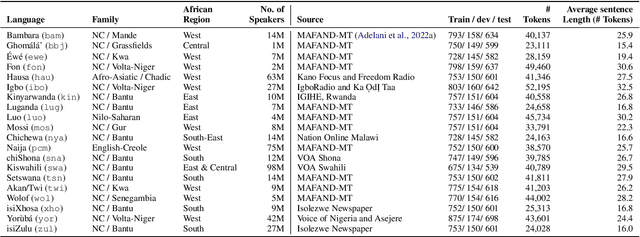


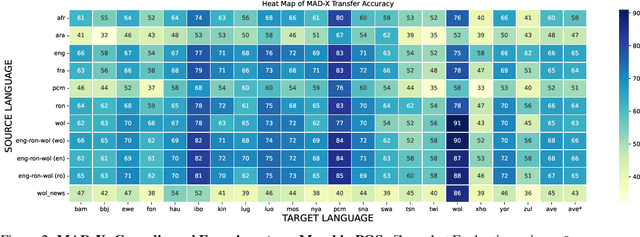
Abstract:In this paper, we present MasakhaPOS, the largest part-of-speech (POS) dataset for 20 typologically diverse African languages. We discuss the challenges in annotating POS for these languages using the UD (universal dependencies) guidelines. We conducted extensive POS baseline experiments using conditional random field and several multilingual pre-trained language models. We applied various cross-lingual transfer models trained with data available in UD. Evaluating on the MasakhaPOS dataset, we show that choosing the best transfer language(s) in both single-source and multi-source setups greatly improves the POS tagging performance of the target languages, in particular when combined with cross-lingual parameter-efficient fine-tuning methods. Crucially, transferring knowledge from a language that matches the language family and morphosyntactic properties seems more effective for POS tagging in unseen languages.
MasakhaNEWS: News Topic Classification for African languages
Apr 19, 2023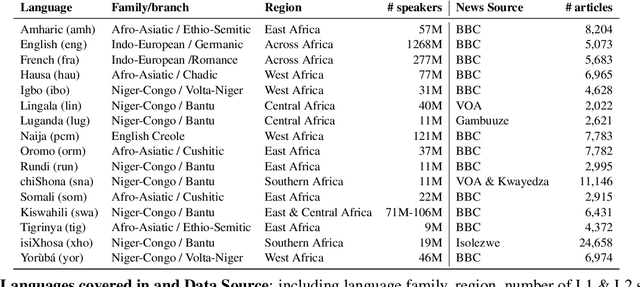
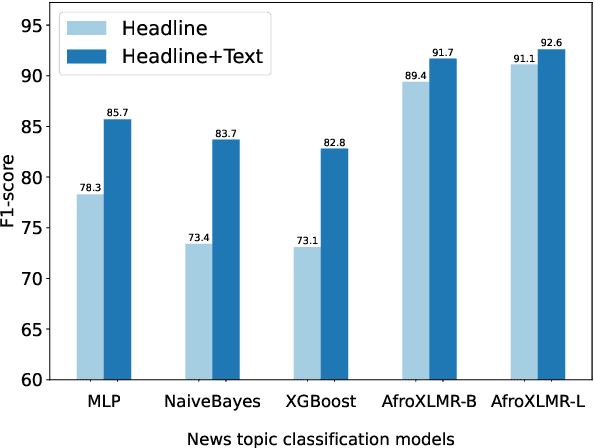
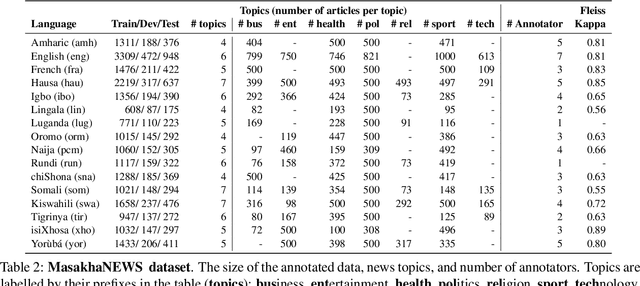
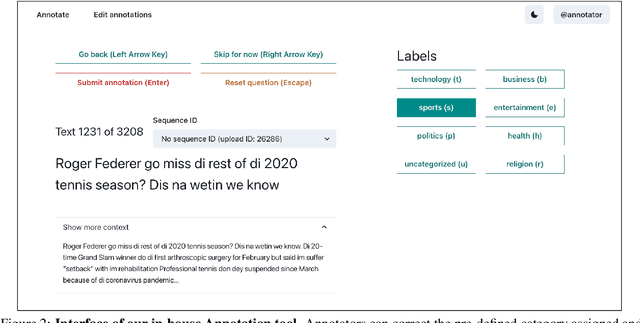
Abstract:African languages are severely under-represented in NLP research due to lack of datasets covering several NLP tasks. While there are individual language specific datasets that are being expanded to different tasks, only a handful of NLP tasks (e.g. named entity recognition and machine translation) have standardized benchmark datasets covering several geographical and typologically-diverse African languages. In this paper, we develop MasakhaNEWS -- a new benchmark dataset for news topic classification covering 16 languages widely spoken in Africa. We provide an evaluation of baseline models by training classical machine learning models and fine-tuning several language models. Furthermore, we explore several alternatives to full fine-tuning of language models that are better suited for zero-shot and few-shot learning such as cross-lingual parameter-efficient fine-tuning (like MAD-X), pattern exploiting training (PET), prompting language models (like ChatGPT), and prompt-free sentence transformer fine-tuning (SetFit and Cohere Embedding API). Our evaluation in zero-shot setting shows the potential of prompting ChatGPT for news topic classification in low-resource African languages, achieving an average performance of 70 F1 points without leveraging additional supervision like MAD-X. In few-shot setting, we show that with as little as 10 examples per label, we achieved more than 90\% (i.e. 86.0 F1 points) of the performance of full supervised training (92.6 F1 points) leveraging the PET approach.
AfriSenti: A Twitter Sentiment Analysis Benchmark for African Languages
Feb 17, 2023



Abstract:Africa is home to over 2000 languages from over six language families and has the highest linguistic diversity among all continents. This includes 75 languages with at least one million speakers each. Yet, there is little NLP research conducted on African languages. Crucial in enabling such research is the availability of high-quality annotated datasets. In this paper, we introduce AfriSenti, which consists of 14 sentiment datasets of 110,000+ tweets in 14 African languages (Amharic, Algerian Arabic, Hausa, Igbo, Kinyarwanda, Moroccan Arabic, Mozambican Portuguese, Nigerian Pidgin, Oromo, Swahili, Tigrinya, Twi, Xitsonga, and Yor\`ub\'a) from four language families annotated by native speakers. The data is used in SemEval 2023 Task 12, the first Afro-centric SemEval shared task. We describe the data collection methodology, annotation process, and related challenges when curating each of the datasets. We conduct experiments with different sentiment classification baselines and discuss their usefulness. We hope AfriSenti enables new work on under-represented languages. The dataset is available at https://github.com/afrisenti-semeval/afrisent-semeval-2023 and can also be loaded as a huggingface datasets (https://huggingface.co/datasets/shmuhammad/AfriSenti).
A Few Thousand Translations Go a Long Way! Leveraging Pre-trained Models for African News Translation
May 04, 2022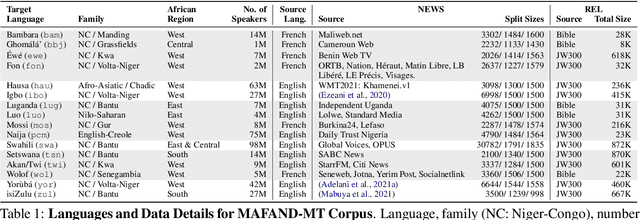
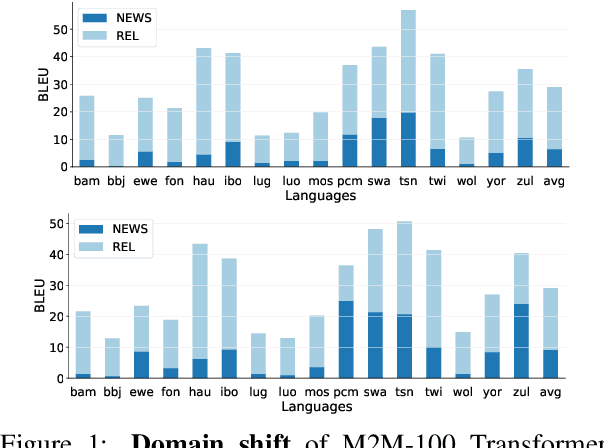
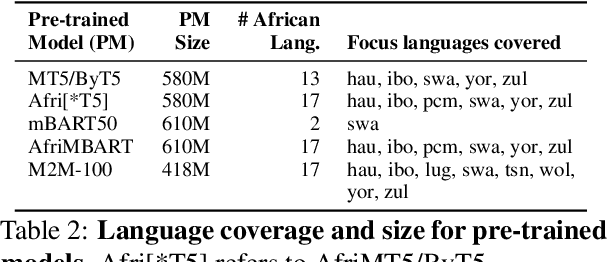

Abstract:Recent advances in the pre-training of language models leverage large-scale datasets to create multilingual models. However, low-resource languages are mostly left out in these datasets. This is primarily because many widely spoken languages are not well represented on the web and therefore excluded from the large-scale crawls used to create datasets. Furthermore, downstream users of these models are restricted to the selection of languages originally chosen for pre-training. This work investigates how to optimally leverage existing pre-trained models to create low-resource translation systems for 16 African languages. We focus on two questions: 1) How can pre-trained models be used for languages not included in the initial pre-training? and 2) How can the resulting translation models effectively transfer to new domains? To answer these questions, we create a new African news corpus covering 16 languages, of which eight languages are not part of any existing evaluation dataset. We demonstrate that the most effective strategy for transferring both to additional languages and to additional domains is to fine-tune large pre-trained models on small quantities of high-quality translation data.
MasakhaNER: Named Entity Recognition for African Languages
Mar 22, 2021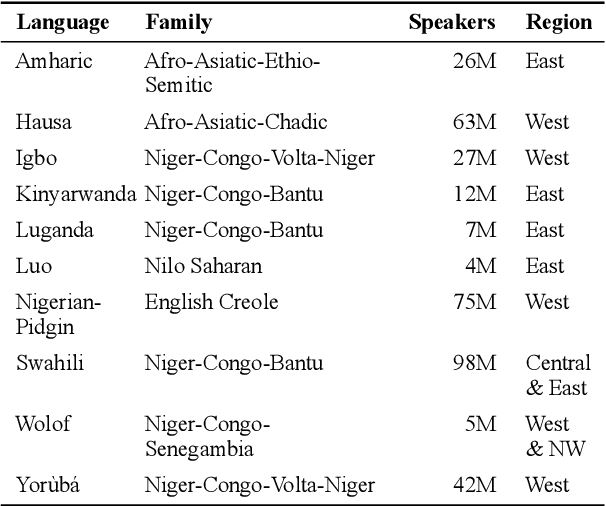
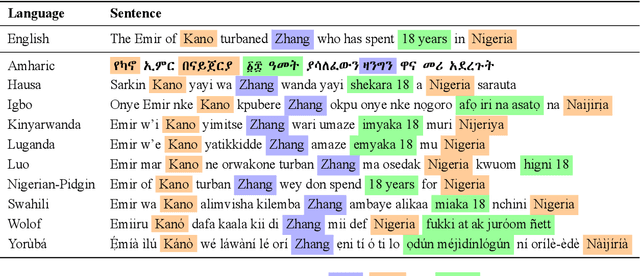

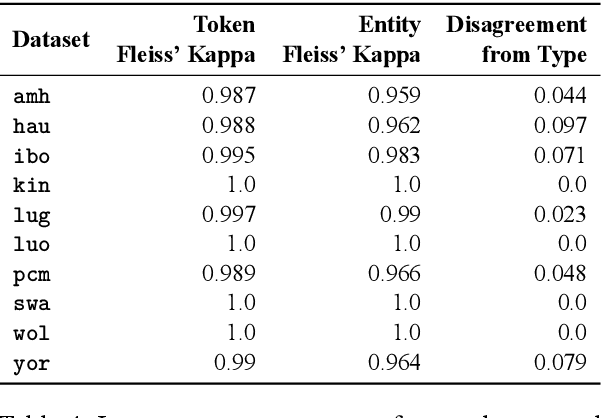
Abstract:We take a step towards addressing the under-representation of the African continent in NLP research by creating the first large publicly available high-quality dataset for named entity recognition (NER) in ten African languages, bringing together a variety of stakeholders. We detail characteristics of the languages to help researchers understand the challenges that these languages pose for NER. We analyze our datasets and conduct an extensive empirical evaluation of state-of-the-art methods across both supervised and transfer learning settings. We release the data, code, and models in order to inspire future research on African NLP.
 Add to Chrome
Add to Chrome Add to Firefox
Add to Firefox Add to Edge
Add to Edge